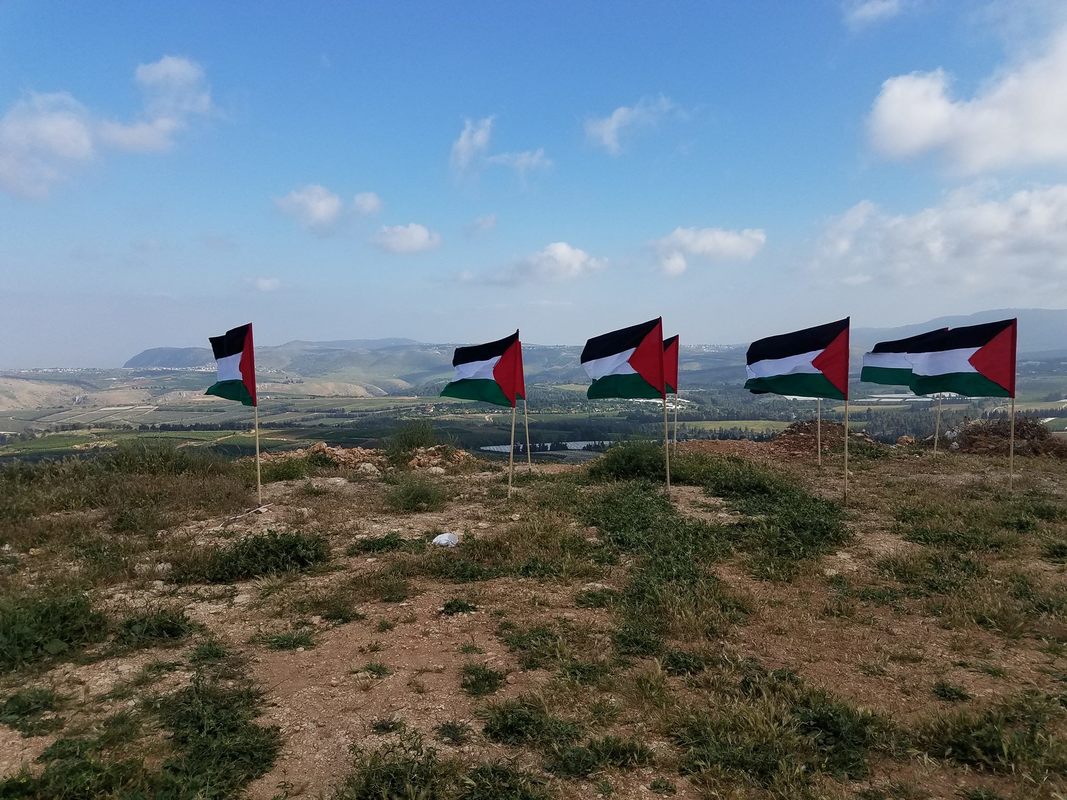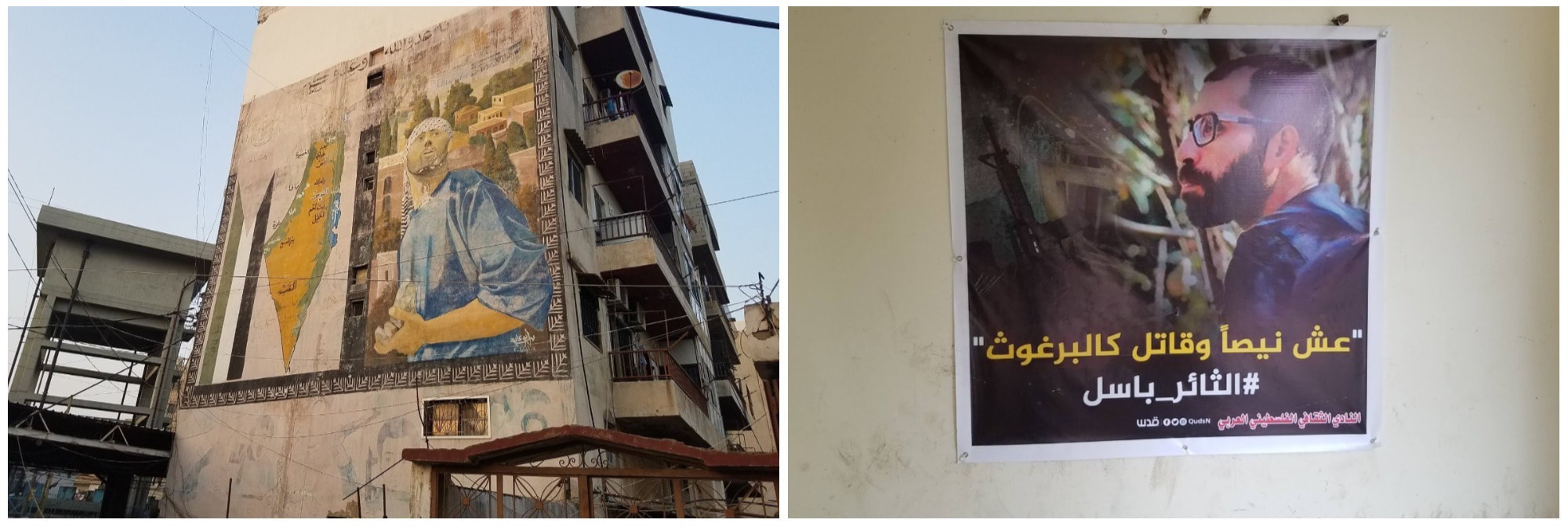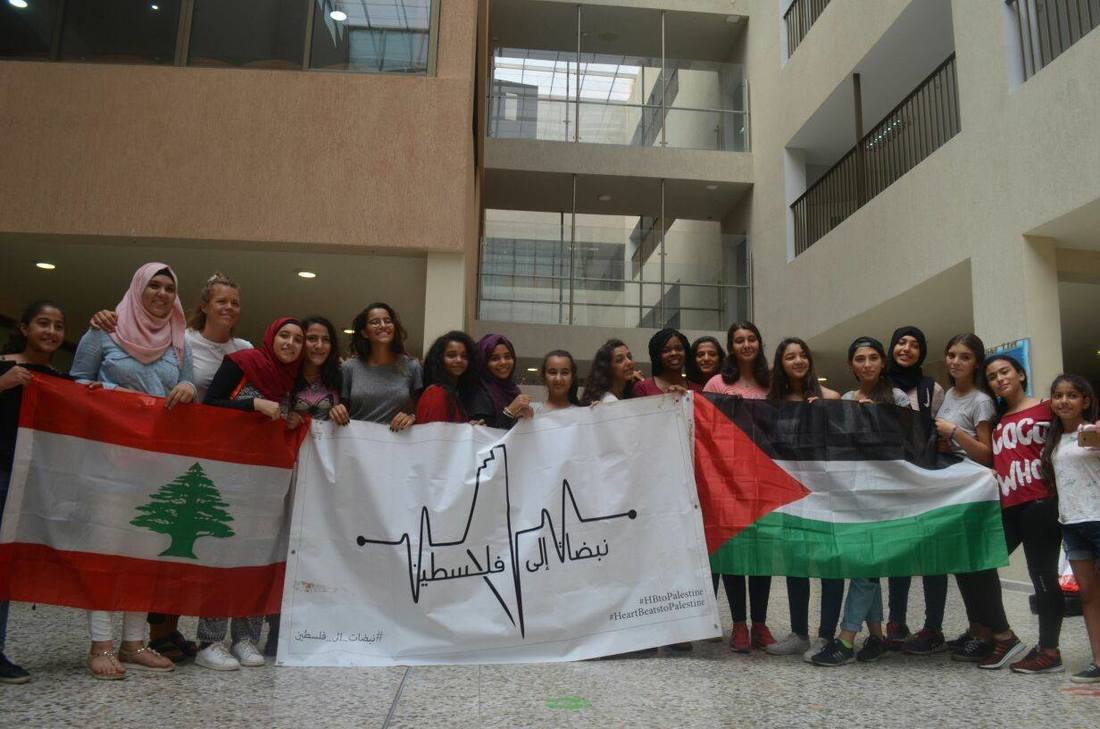Palestinian Refugees in Lebanon Are at the Heart of the Struggle and They Must Return Home in 20181/30/2018
Palestinian flags overlook Israeli-occupied Palestine from the Lebanese border. The following is a reflection a member of Black4Palestine on his 2017 work with Palestinian refugees in Lebanon. Read this and other reflections in our 2017 year in review newsletter Zionist forces ethnically cleansed over 75 percent of Palestinians from their land to create their state in 1948. Today it still denies these refugees their right to return to their homelands, and the Palestinian refugees in Lebanon live among the worst conditions across the diaspora. Last year I took two trips to Lebanon to get a better sense of conditions facing Palestinian refugees in the country and of what local work on Black-Palestinian solidarity might look like. Part of my work is sharing the plight of Black people in the US and helping to draw parallels between our experiences. After talking to a family in Burj el Barajneh camp that knew nothing about the Black struggle in the US for five minutes, they all sucked their teeth in disbelief and immediately noted our similarities. In many ways, Palestinians in Lebanon are the “Black” population of the country. Both Palestinians and Black people face exploitation because of discrimination against our racial or national background. A majority of us are poor both because we were dispossessed from our homelands and because our national economies rely on us for cheap labor. In Lebanon, Palestinians are legally barred from working in 70+ professions, largely forced to live in camps with inadequate electricity, water, and sewage, and face an educational system that guarantees they won’t succeed. Palestinian refugees deal with decades of trauma, poverty, and inadequate social services. The camps are seen as violent and ridden with drugs and crime, and most Lebanese avoid the camps like most Americans avoid Black neighborhoods. The camps are often the only places where other marginalized national groups (e.g. Syrians, Iraqis) can afford to live. While many people are disillusioned about the conditions of the camps and the liberation struggle, the camps still feel like Palestine. Generations of people continue to fight for their country and their people. At the Naqab Center for Youth Activities in Burj el Barajneh Camp, youth are given a map to trace the route to return to Akka in ‘48 Palestine from their camps in Lebanon. At the Arab Palestinian Cultural Club in Baddawi Camp, posters honor the martyr Basil Araj, who was assassinated in Palestine by the Zionist military in March 2017 (pictured below). The map of Palestine hangs everywhere—on the inner walls of people’s homes and on the outer walls of the buildings of the camps (pictured below). Palestine’s spirit and life blood continues, even though Zionists have separated the land from its people for 70 years. I had the chance to visit the Lebanese border with “Israel,” guided by a Nakba survivor who could point to the site of his original village from where we were. Israel has denied him and 7 million other Palestinian refugees their ability to go back home for 69 years now. One look at the land and it is clear why the refugees will never abandon their right to return: the camps are an insulting solution to the beautiful, fertile land they know is theirs. In a world where many of us struggle to say what liberation looks like, Palestinians can see it: it is returning to their land and their homes. Palestinian travels are restricted throughout the Middle East. Palestinians from Lebanon can’t visit Jordan or Palestine; Palestinians from Palestine can’t visit Lebanon; many Palestinians from Syria are now double or triple refugees in the Middle East or Europe. This is the essence of Zionist violence to the region: that indigenous populations that could once move freely between Beirut, Damascus, Haifa, Jerusalem and Gaza are now divided and confined to Western-imposed borders. The right to return of all Palestinian refugees is the most basic line that we in the West owe Palestine and we must name it and fight for it every time we talk about it. “End the occupation” is not sufficient unless we’re talking about the occupation of all Palestine, not just the West Bank and Gaza. Right of return is necessary for justice. Please help us make trips like this possible for more people in 2018 by supporting our work.
A member of Black4Palestine with Palestinian youth at the Heartbeats to Palestine camp for youth in Lebanon. In August I had the privilege of traveling to Lebanon to represent Black4Palestine while building solidarity by working as a coach at Heartbeats to Palestine, a sports camp for Palestinian youth. My role at the camp was as a basketball coach, which was dominated by the girls, although there were a handful of boys. The camp serves Palestinian youth that live in various refugee camps, those that live outside the camps, as well as several Lebanese and Syrian youth. As a former athlete, the camp was unlike any sports camp or sports event I have attended as it combined sports with political, cultural and self awareness. Each day involved the youth practicing two different sports (basketball, soccer, running, swimming, and volleyball were all offered) as well as an activity on politics, culture and self-awareness. This helped to bridge the goal of the camp with the sports. One of the main goals of the camp is to move beyond the awareness of the Palestinian right to return and build capacity for the actual return. I gave a talk at the camp for one of the cultural sessions. I spoke about the history of Black4Palestine and the projects we had going on at the time. I also spoke broadly about police brutality and the persistent non-indictment of white officers, stop and frisk, the patrolling of Black communities, and the training of several city police departments by the Israeli military. The youth had a number of questions: Are they still killing you? If the police are doing this then why would some Black people become police officers? How can these things happen when your President was Black? It was a fruitful conversation on several levels. Black US America is not accessible outside of mainstream media so this was an opportunity for the youth to see into our world beyond stereotypes and negative images. There were lots of questions about my hair, our communities, and how we handle interactions with the police. This conversation also opened up conversations about how they were experiencing their own situation. I had a few days before and after the camp to see Lebanon. I was able to spend time in, visit, or go to events in Jadra, Saida, Beirut, Tripoli, Brumanna, Bekaa Valley, and Miniyeh (the site of the camp). My ability to attend and see so much was because of the generosity of my hosts. I would like to see this be something we participate in annually while also building this relationship throughout the year. The only thing that would make this trip better is to send more than one person. Please help us make trips like this possible for more people in 2018 by supporting our work.
|



 RSS Feed
RSS Feed